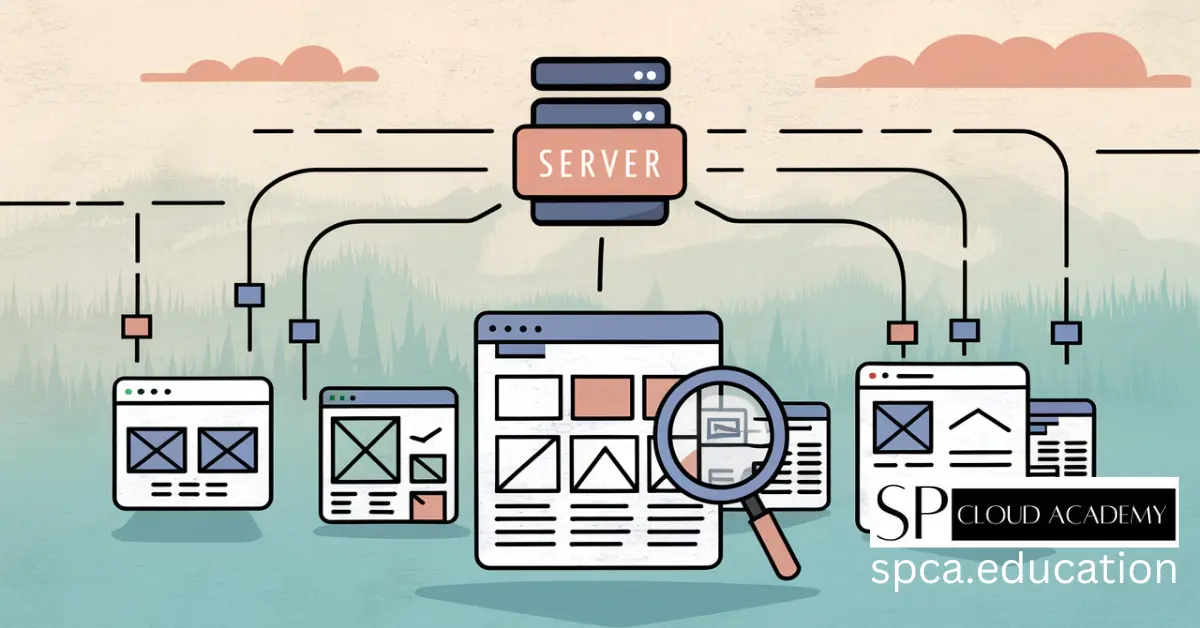Is your website starting to feel sluggish? Are you hitting invisible walls with your shared hosting plan, seeing slower load times as your traffic grows? If you’re nodding along, you’ve likely reached a critical turning point in your online journey. It’s time to stop feeling limited and start exploring a solution that grows with you.
Welcome to the world of VPS web hosting.
This isn’t just another technical acronym to learn; it’s your ticket to superior performance, tighter security, and ultimate control over your digital space. In this guide, we’ll demystify what a Virtual Private Server (VPS) is, why it’s the logical next step for ambitious website owners, and how you can choose the perfect plan to unlock your site’s true potential. Get ready to leave the limitations of shared hosting behind for good.
What Exactly is VPS Web Hosting? The Townhouse Analogy
To understand VPS, let’s think about real estate. Shared hosting is like living in a large apartment building. You have your own apartment, but you share all the essential utilities—like water, electricity, and the main entrance—with hundreds of other tenants. If your neighbor hosts a massive party (a sudden traffic spike), the whole building might experience a slowdown. You have very little control over the building’s rules.
A dedicated server, on the other hand, is like owning a standalone house. All the resources are yours, but it’s expensive and you’re responsible for all the upkeep.
VPS (Virtual Private Server) is the perfect middle ground: the townhouse. You live in a larger building (a single physical server), but your unit is completely self-contained. You have your own dedicated resources (CPU, RAM, storage) that no one else can touch. You get your own front door and can decorate (customize your software) however you like, without affecting your neighbors. This “virtualization” technology splits one powerful server into multiple private environments, giving you the best of both worlds: the power of a dedicated resource pool without the high cost of a dedicated machine.
The “Big Three” Benefits: Power, Speed, and Control
Moving to a VPS isn’t just a small step up; it’s a leap forward in three crucial areas. These benefits directly address the biggest frustrations users face on shared hosting plans.
Unmatched Power & Performance
On a shared server, your website’s performance is at the mercy of other sites. A traffic surge on another user’s site can steal CPU and RAM, slowing your site to a crawl. With a VPS, you get guaranteed, dedicated resources. The portion of the server’s RAM, CPU power, and storage you pay for is yours and yours alone. This means no more “noisy neighbors” hogging resources. Your website will have the consistent power it needs to handle more traffic, run complex applications, and perform reliably, even during peak hours.
Blazing-Fast Speed
Website speed is no longer a luxury—it’s essential for user experience and SEO. Google favors fast-loading sites, and visitors are quick to abandon a slow one. Because your VPS resources are dedicated, your server can process requests and deliver your content to visitors significantly faster. Most VPS plans also utilize high-speed SSD (Solid State Drive) storage, which is exponentially faster than traditional hard drives used in many budget hosting plans. The result is a snappier, more responsive website that keeps both users and search engines happy.
Ultimate Control & Customization
This is where a VPS truly shines for a pro user. Shared hosting locks you into a pre-configured environment with strict limitations. With a VPS, you get root access. This gives you administrative-level control to install and configure almost any software you need. You can choose your operating system (like CentOS, Ubuntu, or Debian), optimize your server settings for specific applications like Magento or a custom-built app, and install security protocols that meet your exact standards. This level of freedom is impossible on a shared plan and is crucial for developers, growing businesses, and e-commerce stores.
Who is VPS Hosting For? Signs You’re Ready to Upgrade
While VPS hosting offers incredible benefits, it’s not for everyone. A brand-new blog with a handful of daily visitors doesn’t need this level of power yet. So, how do you know if you’re ready to make the switch?
Look for these clear signs:
- Your Traffic is Growing Steadily: If your audience is expanding and your shared hosting plan is starting to send you resource usage warnings, it’s a clear signal you need more power.
- Your Website is Slowing Down: Are your page load times increasing? A slow site frustrates users and hurts your search engine rankings. A VPS can provide the speed boost you need.
- You Have Security Concerns: A VPS provides a much more secure, isolated environment than shared hosting. If you’re handling sensitive customer data, running an e-commerce store, or simply want better protection, a VPS is a safer bet.
- You Need Custom Software: If you need to install a specific application, programming language, or server configuration that isn’t supported by your shared host, you need the root access that a VPS provides.
- You Experience Frequent Errors: Are you seeing “503 Service Unavailable” or other server-related errors more often? This often means you’re exceeding the resource limits of your shared plan.
If one or more of these points resonate with you, it’s time to seriously consider upgrading to a Virtual Private Server.
Managed vs. Unmanaged VPS: Choosing Your Level of Control
Once you’ve decided a VPS is right for you, you’ll face a crucial choice: Managed or Unmanaged? This decision hinges on your technical expertise and how hands-on you want to be.
Managed VPS Hosting: This is the perfect option for business owners and users who want the power of a VPS without the headache of server administration. With a managed plan, the hosting provider handles all the technical heavy lifting. This includes server setup, software installation, security patching, updates, and performance monitoring. You get a user-friendly control panel (like cPanel or Plesk) and expert support to help you. It’s the “peace of mind” option that lets you focus on your business, not on server maintenance.
Unmanaged VPS Hosting: This is the “pro” choice for developers, system administrators, and tech-savvy users who demand complete control. With an unmanaged plan, you get a blank slate. The provider gives you the server with an operating system, and the rest is up to you. You are responsible for installing your control panel, managing security, performing updates, and troubleshooting any issues. It’s significantly cheaper and offers maximum flexibility, but it requires a high level of technical skill and a commitment to managing your own server environment.
Key Factors to Consider When Choosing a VPS Provider
Not all VPS providers are created equal. Making the right choice is crucial for your website’s long-term success. Before you commit, carefully evaluate these key factors to find a host that aligns with your needs.
- Resources (CPU, RAM, & Storage): Check the specific amount of CPU cores, RAM, and disk space you get. Ensure the storage is SSD for maximum speed. Start with a plan that meets your current needs but offers room to grow.
- Scalability: How easy is it to upgrade your plan? A good provider allows you to seamlessly add more RAM, CPU, or storage as your traffic increases, often with minimal downtime.
- Uptime Guarantee: Your website needs to be online to be effective. Look for a provider that offers an uptime guarantee of 99.9% or higher. This shows they are confident in their network and infrastructure reliability.
- Customer Support: When something goes wrong, you need help fast. Investigate the provider’s support channels (live chat, phone, tickets) and their availability. 24/7 expert support, especially for managed plans, is non-negotiable.
- Server Location: To ensure the fastest load times for your audience, choose a provider with data centers located geographically close to where most of your visitors are.
- Price and Value: Don’t just pick the cheapest option. Compare the resources, features, support quality, and reputation to determine the true value. A slightly more expensive plan from a reputable provider is often a much better investment.
Your Next Step to a Better Website
You’ve now journeyed through the world of VPS web hosting, from understanding its core concept to knowing what to look for in a provider. The mystery is gone, replaced by a clear path forward. A Virtual Private Server is more than just hosting; it’s an investment in your website’s future, giving you the power to handle growth, the speed to delight users, and the control to build without limits.
Stop letting a crowded, underpowered shared hosting plan dictate your potential. If your website is your business, your passion project, or your professional portfolio, it deserves a foundation that is secure, fast, and reliable.
It’s time to take control. Evaluate your needs, explore your options, and make the upgrade. Unlock the professional-grade power of VPS hosting and watch your website thrive.
See Also
-

Why Every Hosting Provider Is Switching to CloudLinux: The Ultimate Game-Changer for Server Stability
-

Step-by-Step cPanel Installation Guide: Mastering Setup on Your Linux VPS with All Essential Commands
-

Plesk vs. cPanel: Which One Really Wins for Web Hosting in 2025?
-

Mastering Website Performance: The Complete Guide to Google Search Console & Analytics
-

The Only Step-by-Step Guide You Need to Install & Configure cPanel on an Ubuntu VPS
-

WordPress on Subdomain vs. Subfolder: Pros, Cons & Best Choice Explained
-

Step-by-Step: Creating and Revoking Temporary WordPress Access
-

The Ultimate Cloud Hosting Handbook: Every Feature, Benefit, and Pitfall Explained
-

Choosing the Right Dedicated Hosting: Private vs. Public — Everything You Need to Know
-

VPS Web Hosting Demystified: Unlock Power, Speed & Control Like a Pro!
-

The Complete Guide to Shared Hosting: Everything You Need to Know
-

Seamless Site Moves: The 10 Best WordPress Migration Plugins for 2025